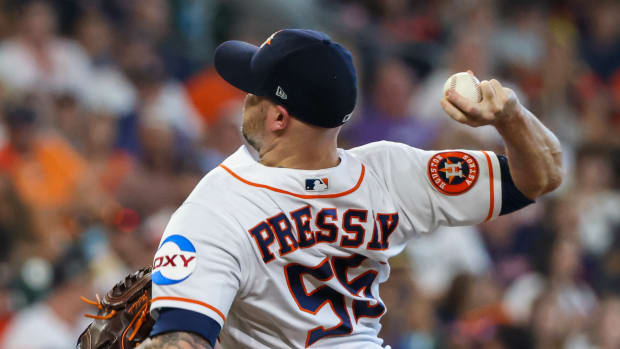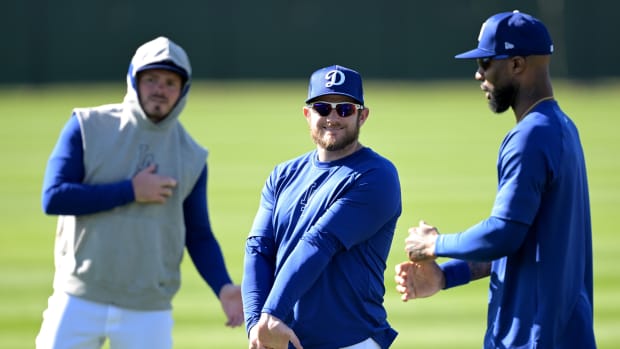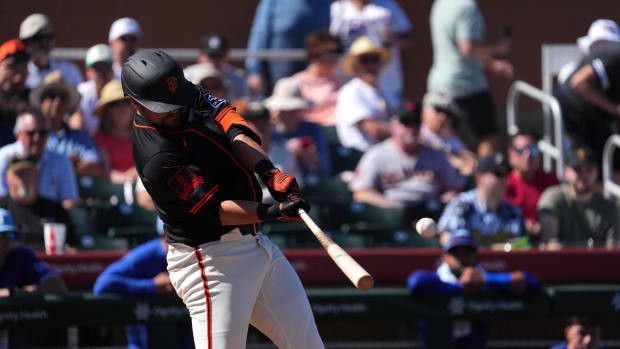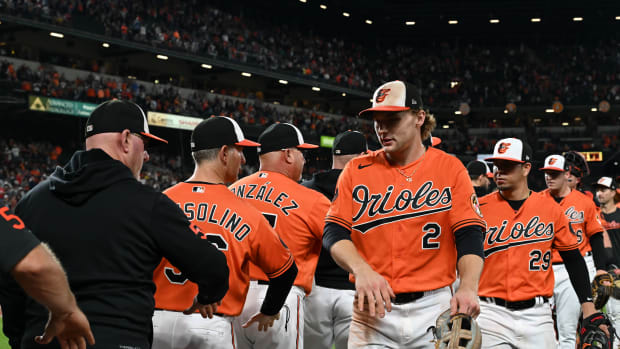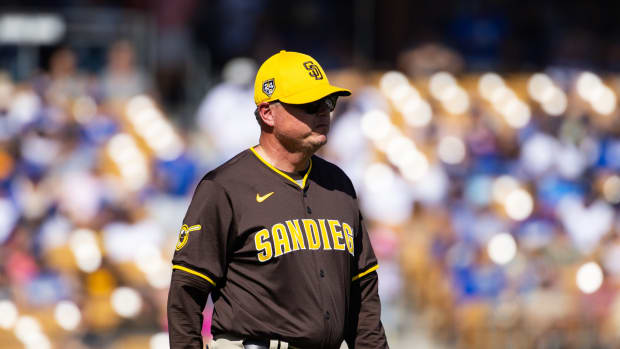Justin Verlander Outduels Chris Sale in Relief Pitching Battle
The last weird and wonderful thing to happen at Fenway Park on Monday afternoon came in the ninth inning when Boston’s talented—and cosmically carefree—rookie Rafael Devers took a pitch deep to the seam where the left-field and centerfield walls meet. Houston Astros centerfielder George Springer and the ball both bounced off the wall, but not at the same time and not in the same direction. Springer rolled to the left, the ball rolled to the right, and Devers just kept rolling around the base paths like a big, old runaway train with Jesus alone at the wheel. It was the first postseason inside-the-park home run by a Boston player since Vermont’s own Larry Gardner touched them all in Game 4 against the Brooklyn Robins in 1916, when baseball analytics were pretty much limited to trying to count how many beers that Ruth kid had hammered after the previous night’s play. That cut a late Houston lead to 5-4, but that was the way things stayed, and the Astros moved on through the playoffs.
“The emotion,” Houston manager A.J. Hinch said, “is great on the back end. It’s pretty agonizing during the game and we’re pretty exhausted, but what an emotional day for us.”
There was a sense of urgency to the proceedings that set in shortly after Boston won the third game and everybody started watching The Weather Channel. The orphaned remnants of Hurricane Nate were due to arrive sometime in the mid-to-late afternoon and the skies around Boston looked like the bad end of a Terrence Malick movie all throughout the game. Once started, a playoff game has to be played to its conclusion, whether that comes after a six-hour rain delay, or at 1:00 the following afternoon. Speculation was that, if the clouds began to glower down ferociously enough, the strike zone of home plate umpire Mark Wegner—and we will have more about him in a bit—might well extend to the Cape Cod Canal. But, remarkably, the game got played. And it must be noted, the game was played remarkably. Besides Devers’s sprint, we saw a Red Sox manager get run by Wegner in the second inning. Dustin Pedroia looked as though he wanted to light Wegner’s head on fire after getting called out on a low pitch. John Farrell went out to keep his second baseman in the game and out of jail. He and Wegner chatted for a spell and Wegner tossed him.
“The reason he gave me,” Farrell said, “was, ‘I’m not going to let you stand there and yell at me.’”
We also saw a gutty pitching matchup between the team’s two aces—Justin Verlander for the Astros and Chris Sale for the Red Sox. The problem was that the duel began in the fifth inning. By then, both starters were gone; Houston’s Charlie Morton and Rick Porcello of the Red Sox combined for a 2-1 Houston lead that well could have been 11-10. Both of them were walking thrill-rides, dancing in and out of trouble until neither manager could take the strain any more. Farrell moved first, bringing in Sale to start the fourth inning. Verlander, as surprised as anyone in the ballpark, came on an inning later to face Boston’s Andrew Binintendi. It was the first time he’d ever pitched in relief.
“When I got here today, they looked at the weather situation and they asked me if I was good to pitch if we were in a delay situation,” Verlander said. “After I threw, I said, yeah. And when they found out we weren’t in a delay any more, they just said go down there and be ready. They said, ‘Can you get Binintendi?’ And I said, sure, and that didn’t work out so well. The rest of it did.”
Binintendi drove a 2-2 pitch deep into the darkening right field grandstand, scoring Xander Bogaerts ahead of him and staking Sale to a 3-2 lead that the pitcher held over the next two innings in a performance similar to that of David Price on Sunday, another erstwhile Boston starter whose long relief stretch had kept the Red Sox alive in the series.
“It’s pretty crazy,” Verlander said. “I kind of glanced across dugouts and I saw [Sale] on the rail, and I didn’t know if he was looking in my direction or not. I wanted to tip my cap. I’ve battled against that guy a lot. I had a lot of respect for him, the way he goes about his business, and the pitcher that he is. I appreciated the battle that him and I had today, even though it wasn’t the normal starting one, it was different in its own nature, but it was still a lot of fun.”
Sale came out again to pitch the eighth inning, and Houston’s Alex Bregman took him over the wall to tie the game at 3. The Astros added another run in that inning, and one more in the ninth, before the end of the season chased Rafael Devers the full 360 feet. Ultimately, for all this particular game’s eccentricities, the series was decided by the fact that the Houston Astros have constructed a battlewagon of a batting order.
Right now, as they wait for the ALCS to start, and their averages fattened by two games at home in which Houston outscored the Red Sox 16-4, the Astros have six players hitting .400 or better in the post season. They have two players hitting better than .500 including possible MVP Jose Altuve, who went 0-4 yesterday and dropped his postseason average to an anemic .533. Boston had nothing to match that, especially with their starting pitching so inconsistent. (Sale started the first game and got roasted on a spit for seven runs on nine hits.) The lineup is vastly deep and filled with players who work pitch counts like artists. Bregman did it to Sale for his home run, waiting for a changeup he knew was coming.
“When we were back home,” Bregman said. “He started me off with a changeup and then he ended up striking me out on my third at-bat with a changeup. I was looking for it the whole day. I got a little anxious in my first at-bat and popped it up to center because I was so excited and I’d guessed right. I told myself that I would get it again. I just needed to stay closed and stay on it. I was fortunate to get a good pitch to hit and to put a good swing on it.”
One batter later, Josh Reddick fouled off a long series of 95 mph fastballs from Boston closer Craig Kimbrel before singling in the run that put Houston into the lead for good. “They’re a quick strike offense with great two-strike capability,” said Farrell. “You’re never really out of an inning.”
“You have guys where you have a hard time getting swings and misses,” said Verlander, whose season turned around when he joined Houston in the middle of it. “Breg, his baseball IQ is off the charts for such a young guy. The moment’s never too big for him, I can see that already. Reddick, he’s such a tough at-bat. As a pitcher, once you get into those battles, and guys fouling off your stuff, or not swinging at your good pitchers, it becomes harder to get them out.
“Since I came over, I learned that, with this lineup, you just can’t let the ball get rolling. Once that happens, they’re all animals from top to bottom. Man, it goes in a hurry. I pitched against them twice this year and I had one good and one bad. I know how hard it is to work through this lineup.”
It’s been a strange stretch drive for the Astros, who caught fire just as their city was drowning. There have been two other once-in-a-century storms since Harvey flooded Houston, which is still recovering even though Harvey has been pushed to the back of the news cycle’s limited short-term memory by Irma and then by Maria. “The city is still rebuilding and it’s easy to look in the rear-view mirror and think that the hurricane is over and the rebuild starts and it is not going to stop for a long time,” said A.J. Hinch. “That was probably the most emotional day I’ve ever had on the field that day we played the doubleheader, when the city was underwater, and some fans came out.” Back in his clubhouse, there was a deluge of champagne and domestic beer while, outside, as the ballpark packed up for the winter, the bits and pieces and showers and gales of yet another hurricane finally showed up. There’s a rhythm to all these things, even to things that otherwise appear extraordinary and random. You can feel it if you really try. One thing follows another, except not always at the same time and not always in the same place.































